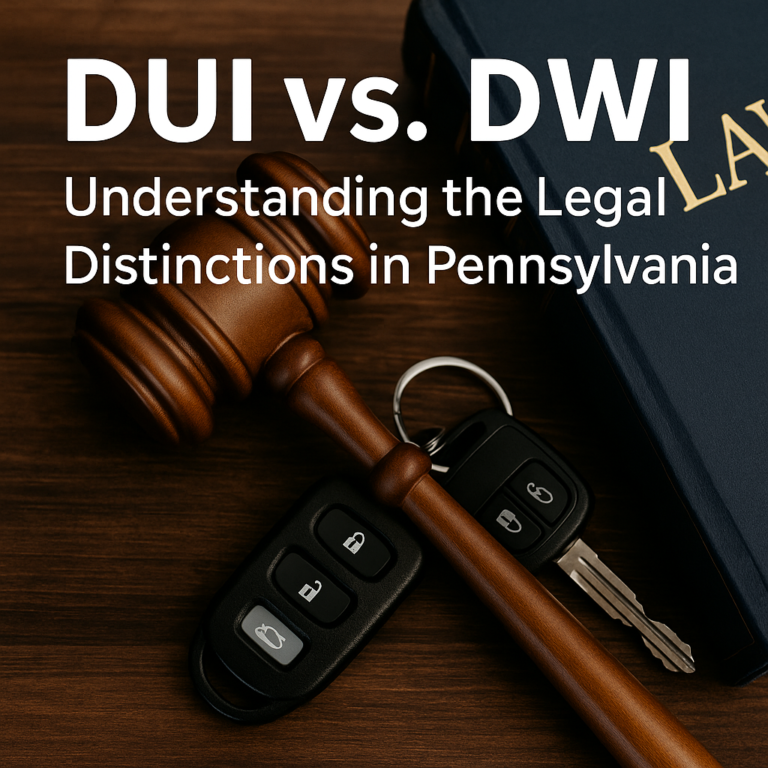
DUI vs DWI in Pennsylvania – When it comes to impaired driving charges, many people wonder about the difference between DUI (Driving Under the Influence) and DWI (Driving While Intoxicated or Driving While Impaired). While these terms are often used interchangeably, their definitions and legal consequences can vary depending on the state. Understanding the distinctions can help drivers navigate the legal landscape and avoid serious penalties. Remember, DUI vs DWI in Pennsylvania compared with other states may apply different consequences.
What is DUI?
A DUI (Driving Under the Influence) typically refers to operating a vehicle while under the influence of alcohol, drugs, or any substance that impairs cognitive and motor functions. This can include prescription medications, over-the-counter drugs, and illegal substances. Many states set a blood alcohol concentration (BAC) limit of 0.08%, but drivers can still be charged with a DUI even if their BAC is lower, depending on their level of impairment.
Penalties for DUI:
-
- First offense: Fines, license suspension, mandatory DUI classes, and possible jail time.
-
- Repeat offenses: Harsher penalties, including longer license suspensions, increased fines, ignition interlock device (IID) requirements, and extended jail sentences.
What is DWI?
DWI (Driving While Intoxicated or Driving While Impaired) generally refers to driving with a BAC over the legal limit (usually 0.08%) or driving while visibly impaired. Some states differentiate between DUI and DWI based on the severity of impairment, with DWI often considered a more serious charge.
Penalties for DWI:
-
- Higher fines and penalties compared to a DUI in some states.
-
- Potential felony charges if aggravating factors are present (e.g., accidents, injuries, or minors in the vehicle).
-
- Increased insurance rates and long-term driving restrictions.
DUI vs. DWI: State Variations
Each state has its own way of classifying and penalizing impaired driving offenses:
-
- Some states use DUI and DWI interchangeably, with no legal difference.
-
- Others distinguish DUI as a lesser offense and DWI as a more serious charge.
-
- Certain states use other terms, such as OUI (Operating Under the Influence) or OWI (Operating While Intoxicated).
For example:
-
- Texas: DWI refers to alcohol impairment, while DUI is typically charged to minors under the state’s zero-tolerance law.
-
- New York: DWI is for drivers with a BAC of 0.08% or higher, while DUI is a broader term for any impairment due to drugs or alcohol.
-
- California: Primarily uses DUI for all impaired driving charges.
How to Avoid a DUI or DWI Charge
The best way to avoid a DUI or DWI is not to drive if you’ve been drinking or using any impairing substances. Consider these alternatives:
-
- Use a designated driver.
-
- Take a rideshare service (Uber, Lyft, taxi).
-
- Stay at a friend’s house or a hotel if necessary.
What to Do If You’re Charged with DUI or DWI
If you’ve been charged with a DUI or DWI, it’s crucial to consult with an experienced DUI attorney as soon as possible. A skilled lawyer can:
-
- Examine the details of your case.
-
- Challenge evidence such as BAC test results.
-
- Negotiate for reduced charges or penalties.
Final Thoughts
If you’ve been charged with DUI or DWI in Pennsylvania, it’s essential to have experienced legal representation to protect your rights and fight for the best possible outcome. Navigating Pennsylvania’s DUI laws can be complex, and penalties can vary based on blood alcohol content (BAC), prior offenses, and other factors. Whether you are facing license suspension, heavy fines, or potential jail time, having the right criminal defense attorney on your side can make all the difference.
At The Town Law, LLC, their Philadelphia DUI attorneys understand how to challenge DUI evidence, negotiate plea agreements, and, if necessary, take your case to trial. They provide aggressive defense strategies tailored to your unique situation, ensuring that every legal avenue is explored to protect your future. To learn more about how The Town Law, LLC can assist with your DUI case, visit their dedicated DUI defense page here.
Disclaimer
The information provided in this blog is for general informational purposes only and does not constitute legal advice. DUI and DWI laws vary by state, and the details of each case can impact legal outcomes. Reading this blog does not establish an attorney-client relationship with PhillyLegalConnect, The Town Law, LLC, or any affiliated attorneys. If you are facing DUI or DWI charges, you should consult a qualified criminal defense attorney for legal guidance specific to your situation. PhillyLegalConnect is not a law firm and does not provide legal representation.

